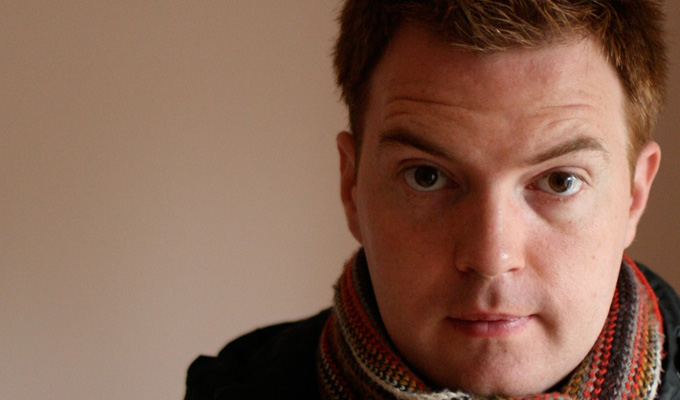

Cat Laughs, Kilkenny 2016
Note: This review is from 2016
Review by Jay Richardson
If there was a recurring theme to this year’s Cat Laughs comedy festival in Kilkenny, it was shock and awe at the city’s proud new statue of hurling players entwined in aerial combat, with few comics slow to note the fierce homo-eroticism radiating from the bronze in the sunshine.
On stage, there were mixed fortunes for visiting Brits. Both Nish Kumar and James Acaster delivered sets that were damningly critical of our Empire and colonial legacy, a subject the Irish know a little about.
Despite Kumar’s self-mockery of his status as a critically acclaimed comic who sells no tickets, he aced his headlining spot with bullish delivery, even if the target was largely his own behaviour at music gigs. In a traditionally mono-ethnic nation like Ireland, he’s well aware of the disconnect between his accent and complexion. But it’s his own pompous self-righteousness that led him into gritty criticisms of Britain’s behaviour in Australia and India, mixing the personal and the political to great effect.
In marked contrast, Acaster was a beaten man before he even walked on. By the time I caught him over the weekend, he’d had three people tell him they were his heckler from the previous show, part of a trend stretching back years that invariably sees him begin with an apology to Irish crowds for being so very English.
Partly, you sense, his fate has become a self-fulfilling prophecy, as there seemed genuine sympathy for him from an audience moved by his simmering pique. However, even at this show there was an interrupting dolt that chimed in with inexplicable and unwanted contributions.
Denigrating the English, brilliantly satirising the British Museum’s looting through a pernickety critique of its giftshop, Acaster still couldn’t see himself emerging triumphant. There’s grisly entertainment value in seeing a usually composed master of his art perform though a red mist. But perhaps Kilkenny’s 20-minute spots aren’t the best format for a crowd to get a bead on his off-kilter persona.
Acaster featured as part of an odd gig all round, a compelling line-up that also featured David O’Doherty and returning emigres Maeve Higgins, Chris Kent and Eleanor Tiernan. The latter carried on Acaster’s war of attrition with the crowd, reacting with fury to the punter who greeted her arrival by pointing out she’s Tommy Tiernan’s cousin. Her anger at the slight seemed justified as she’s a perennially underrated performer, with Ireland’s abortion laws adding further grist to her mill and her recent move to London adding cultural friction to her more daydreamy musings.
Kent, similarly, hasn’t had to look too hard for evidence of potato-inspired racism against him in England, though as with Tiernan, he winningly casts doubt on his testimony as a reliable witness. The young Corkman has matured into a truly gifted storyteller with a deceptively naturalistic style. And if he can eke as much gold out of his new baby as he can his recent marriage, he’ll secure his overdue Edinburgh Fringe breakthrough.
Higgins has little need of such exposure, having bypassed all that for New York. How her intimate, conversational delivery plays over there I’d love to see but the social differences she notes afford her an intriguing transatlantic novelty. Contrasting the casual sophistication of Gotham dating with the furious drinking and grinding of Irish hook-ups, her honesty and robust-but-whimsical attitude towards her body issues have only strengthened her warmly engaging, distinctive voice.
Elsewhere, Gearoid Farrelly impressed with a set advocating against Ireland’s gay marriage legislation, largely based on his own experience of moving in with his boyfriend, his sarcastic wit and working-class chippiness sustaining some gleefully caustic routines that got a great reception.
Al Porter, similarly, stormed with his disclosures of bringing men back to his parents’ house for the first time. At once a throwback to the likes of Frankie Howerd with his fondness for innuendo and slavery to showbusiness, his frank, out-and-proud tales and cutting, occasional cruelty define him as both fluffy and spiky, surely an irresistible combination for the 23-year-old’s inevitable march to stardom.
Jason Manford and Bernard O’Shea both capably trod the tricky line of sharing how much they fear, loathe and resent their kids, while never leaving you in any doubt how much they love them. The Mancunian momentarily lets dark thoughts interrupt his everyman relateability, while the Irishman’s feverish imagination conjures up crazed alternative scenarios for family incidents, potential disgraces for when he finally snaps.
Finally, credit to Jason Byrne. Routinely guilty of declaring each audience or night as the maddest he’s ever experienced, at successive shows he nevertheless conjured terrifically entertaining mayhem from dragging blokes up to flounder through all the prop-based nonsense he’s barking them through.
Playing the disturbed ringmaster, who can’t understand his marks’ inability to carry out his demented demands, he persuasively creates entire characters for them from just the briefest responses. An admirable skill that perhaps doesn’t get enough recognition.
Published: 6 Jun 2016
Bernard O'Shea: Do Not Adjust Your Mind, Reality Is At Fault
Bernard O’Shea is either an undiscovered, if unfocussed…
1/01/2008
Bernard O'Shea – Original Review
Bernard O'Shea is a fizzing, iridescent ball of sheer…
2/06/2007
Past Shows
Agent
Janette Linden
Contact by email
22 Rathbone Street
W1T 1LG
Office: 020 7287 1112

